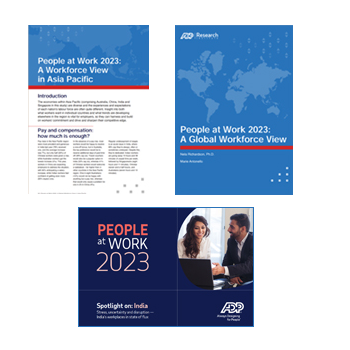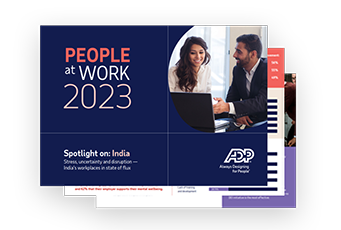What do workers want and how can you deliver it?
Following one of the largest global surveys of its kind — undertaken between 28 October and 18 November 2022 — ADP Research Institute® brings you vital intelligence into the attitudes, aspirations, wants and needs of 32,612 workers in 17 countries, including 8,613 working exclusively in the gig economy.
How you can benefit from this research:
- Discover what your employees might really be thinking
- Adapt your approach to people recruitment, reward and retention
- Apply the findings to drive your business transformation.
What employees want you to know:

Job satisfaction
While 87% feel optimistic about the future, 62% think no sector will escape the effects of the current economic uncertainty and almost four in 10 (37%) don’t feel secure in their jobs.

Pay and benefits
61% say salary’s the key factor in their job and 62% expect a pay rise from their current employer in the next year. Yet 43% are sometimes, often or always underpaid.

Mental health
Nearly half (47%) say their work suffers due to poor mental health while 65% claim stress adversely affects performance. Employers are responding through positive mental health initiatives.

Flexibility
Nearly half (48%) say they could relocate overseas with their existing employer. Workers now prioritise career progression and job enjoyment over flexible hours and locations.

Stability and job security
The Asia Pacific region is an economic powerhouse. Here workers have a reputation for hard work and expect to be suitably compensated.
But our research in Australia, China, India and Singapore has also shown the region to be a leader in ways other than the simply economic — from Diversity, Equity and Inclusion (DEI) to mental health awareness.
Despite recent economic uncertainty, the research reveals a stabilisation across the region — from levels of optimism, job satisfaction and unpaid overtime to fewer workers considering a career change. No surprise then that job security fears appear to be receeding.
Download reports
The world faces a chronic skills shortage
Get the knowledge you need to hold on to talent.
Download reportsSpotlight on: Asia Pacific
Recognise and reward the effort and energy
While business leaders can sharpen their competitive edge by harnessing their workers’ commitment and drive, they cannot take these for granted. This year’s research indicates that employers in the Asia Pacific region still have work to do to meet employee expectations across a range of workplace policies.
Let’s take a closer look:
Pay
The average pay rise across the region was 7.2% but the numbers of workers saying ‘I am always, often or sometimes underpaid’ ranges from 27% in China to a worrying 70% in India.
Job fulfilment
Year-on-year, fewer workers in the Asia Pacific region are considering a career move. But still a quarter to a third are thinking of a change, from shifting industry to establishing their own business.
Wellbeing
On average, 44% of employees across Asia Pacific say mental health is adversely affecting their performance while 66% state stress is also causing their work to suffer.
Diversity, equity and inclusion
A DEI gap is emerging: Chinese and Indian workers enjoyed the greatest DEI improvements in the past three years, with 89% and 94% respectively saying their employer are offering DEI initiatives. Yet, the number falls to 76% in Australia and 79% in Singapore.
Flexibility
Having some choice over location and hours has become the norm. Workers now rank career progression (27%) and job enjoyment (48%) as more important factors.
Career progression
Chinese workers seem satisfied with their training and development (61%) and career progression (58%) but in the other Asia Pacific nations, around a half or less are happy with these aspects.
Spotlight on: India
Rising aspirations
Pay rises in the Asia Pacific region were most prevalent and generous in India last year (78% received one), and 95% of the country’s employees are satisfied in their current employment. Despite this, India is the only surveyed country in the region where unpaid overtime hasn’t reduced year on year – in fact, India has the highest estimated overtime worked (>10 hours per week).
Although 75% of Indian workers say that their employer talks to them about career progression, significant numbers still have itchy feet. 38% say they’re actively trying to make a change and almost a third (29%) have considered starting up business of their own over the last 12 months.
Diving in deeper:

Short-changed?
49% of Indian staff think they’re underpaid for their role, higher than the Asia Pacific average of 42%. Meanwhile, a large number are paid incorrectly - 70% say their wage packet is ‘always, often or sometimes’ lower than it should be.

Remote control
76% of Indian employees believe their personal productivity has improved from working remotely. A similar number (77%) say they’ve continued to collaborate with their team while working off-site.

Big ambitions
Almost half of Indian workers surveyed (49%) are expecting a promotion over the next 12 months, with an identical number expecting a pay rise. Yet only 15% expect a formal review in the same period.

Pay day changes
Over the next 5-10 years, over a fifth (21%) of Indian staff want to see employers adopt non-traditional methods of payment such as mobile wallets or pre-payment cards.
Get your reports now - discover key insights to better understand your workforce and transform your business.


Stress, uncertainty and disruption — India’s workplaces in state of flux
If employers in India continue to respond to workers’ expectations of flexibility across all facets of their work, they can shape new ways of work and pay and ensure a productive, satisfied and forward-looking workforce.
Download
